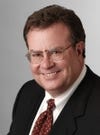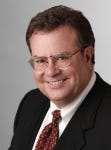John Baugh: 1916 - 2007
It is hard to overestimate the impact John Baugh's vision had for the foodservice industry we know today.
John Lawn
 I only rarely use this page for obituaries, but found it impossible to ignore the industry's loss of a true giant when John Baugh passed away in March of this year. It is hard to overestimate the impact he and his vision had on foodservice distribution and the foodservice industry as we know it today.
I only rarely use this page for obituaries, but found it impossible to ignore the industry's loss of a true giant when John Baugh passed away in March of this year. It is hard to overestimate the impact he and his vision had on foodservice distribution and the foodservice industry as we know it today.
Baugh will always be remembered as the founder of Sysco Corporation. He epitomized a generation of entrepreneurs in the post WWII era who looked at foodservice as a tremendous personal and business opportunity. The company he founded bore that belief out.
Baugh's career began when he was 13, as a stock boy for the local A&P in his home town of Waco, TX. He continued to work for A&P while attending Baylor University and the University of Houston. Early on, he was fascinated by the convenience and quality advantages frozen foods offered and saw great promise in distributing them to restaurants and institutions. Baugh and his wife, Eula Mae, started their own company to do this, Zero Foods, in Houston in 1946.
During the years that followed, Baugh remained a student of the industry and began to focus on the potential he saw in serving the multi-unit restaurant chains that were then developing.
In March of 1970, he was instrumental in convincing eight other distributors to join his company in forming Sysco. The name was an acronym for Systems Services Company, and represented his vision for the kind of multi-branch organization that would be needed to serve the industry as it grew.
By 1973, Sysco had attracted 14 additional distributors into its fold and had reached sales of $300 million, handily surpassing market leaders like Continental Coffee, Monarch Institutional Foods and John Sexton Co. By 1980, Sysco had 35 operating companies with over $1 billion in sales. The growth continued, capped by Sysco's acquisition of CFS Continental in 1988, giving it close to $7 billion in sales and setting the stage for the company we know today.
Under Baugh's leadership over those two decades, Sysco perfected many of the distribution practices we take for granted now. Among them: the broadline distribution model; the financial reporting structure that was the key to Sysco's growth; the use of controlled label product and "concept categories" to build market share; the development of a dedicated systems arm to serve limited menu national chains; and the use of acquisitions and territorial fold-outs to achieve regional market penetration.
Baugh served as chairman of the Sysco Board of Directors until 1985 and remained senior chairman through 1997. Among other industry awards, he received the Herbert Hoover Award from the National-American Wholesale Grocer's Association (now part of FMI), was the first person inducted into the Hall of Fame of the National Frozen Food Association, and the first to receive the Lifetime Achievement Award of the International Foodservice Distributors' Association.
Baugh's reputation for generosity is well known. He was a regent of Baylor University for many years, and is said to have contributed over $20 million to the university's causes. He devoted countless hours to his Baptist church and its institutions. At the same time, he was an outspoken critic of what he saw as fundamentalist efforts to dominate the Southern Baptist Convention.
There was much more to Baugh than his public reputation details. An old distributor friend of mine whose father's company was visited by Baugh many times during the years when he was "scouting" early acquisition prospects tells me that Baugh once arranged to have his mother flown to Houston to be examined by an eye surgery specialist. His mother had been nearly blind since she was a young woman. He and many others say that such human kindnesses were typical of Baugh's approach to life, and not negotiating strategy.
Over his years at Sysco headquarters, Baugh never had an assigned parking space at headquarters and as a company policy, neither he nor other executives in Sysco were permitted to fly first class unless they paid for the upgrade themselves. In an era when corporate scandal and extravagance have dominated the headlines, Baugh's expectations for ethical corporate behavior are a standard many corporations could learn from. His life and example are worth emulation.
About the Author
You May Also Like




.jpg?width=300&auto=webp&quality=80&disable=upscale)

.jpg?width=300&auto=webp&quality=80&disable=upscale)